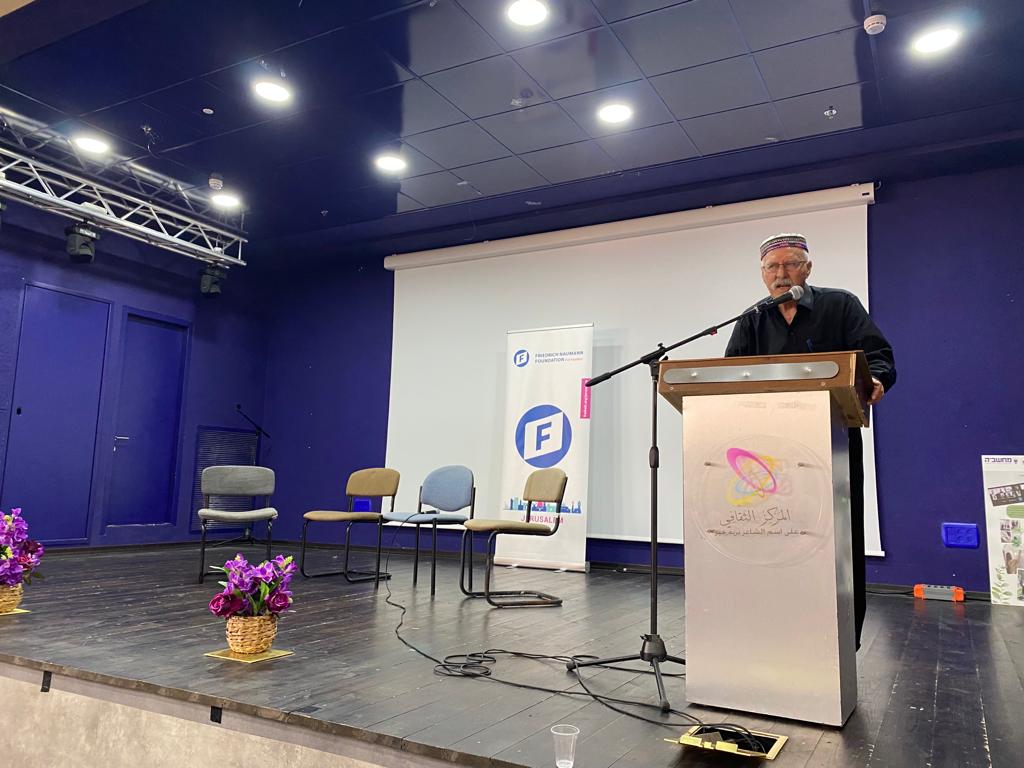Shared Society
Re-examining Govenment Policies Toward Minorities in Israel

Together with our partners Forum for Liberal Thinking and the Liberal Druze Association, we organized a discussion on government policies towards minorities in Israel. The event took place in Daliyat Al Carmel, the biggest Druze town in Israel close to Haifa, and included a mixed audience of Jews, Druze and of other communities. Eran Zinger, well-known journalist (Kan 11) and expert in Arab affairs, moderated the session in his usual sensitive and insightful manner, while contributing from his immense knowledge and experience.
The discussion panel also included prestigious speakers among them, Sheikh Zeidan Atashi, head of the Liberal Druze Association, Rafik Halabi, head of Daliat Ha Karmel Council, Orna Cohen from the Truman Institute and Hasham Hussein, former Director general of the Ministry for the Development of the Negev and the Galilee and Itamar Radai from the Open university. They raised existing challenges in areas of housing, budgeting and education, while it became clear that one of the most pressing problems in the Druze and wider Arab society is the problem of housing. Building permits are issued reluctantly and only after a long (several years) bureaucratic process. One ramification of this situation is illegal housing and hence there are still a whole lot of houses in Druze villages not connected to electricity.
Moreover, the budgeting for minority communities is not adapted to the real needs of the population and this underfinancing over the years has caused great gaps in development of the respective communities and their towns and villages.
Specifically, regarding the Druze community in Israel, which since the foundation of the state of Israel maintained excellent ties with the state and also recruits its young men to Israel’s army, it became clear that government decisions and laws passed over the last years have caused a severe preach of trust never seen before among Druze community towards the state. The so-called Admissions Committee Law (2011), the Nation State Law from 2018 and the now discussed Zionism Law are seen as attempts to provide privileges to Jewish population and expand their dominant standing on the expense of non-Jewish population groups in the country. These developments also have caused a severe leadership crisis within the Druze community. The young generation blame their leaders for not having been able to prevent these discriminatory laws. Their discontent finds its expression for example in an apparent decline in motivation to recruit to the army and an increasing identification of the young Druze with the rest of the Arab society and their struggle for equality. Another trigger of disappointment for the Druze community was the fact that only very few fellow Jewish citizens joined their demonstrations against the nation state bill back in 2018. Hence, they reject the voices among the Jewish majority who are criticizing Druze or Arabs for not joining in masses the current anti judicial overhaul demonstrations, seeing them as hypocrites.
The very lively and engaged participation of the audience in the discussion event showed once more, how important it is, that people start to speak again with each other and not only about each other. Many misunderstandings and false perceptions stem from the lack of direct interaction and exchange. This situation causes misunderstandings, mistrust and finally often leads to open hate and violence. Next to civil society initiatives, which encourage bilateral encounters and exchanges (see above), also the education system and the media should play a more central role in bridging between Israel’s different population groups and contributing to a better understanding of each other’s’ positions and perspectives.
